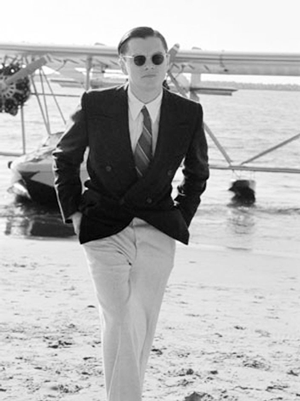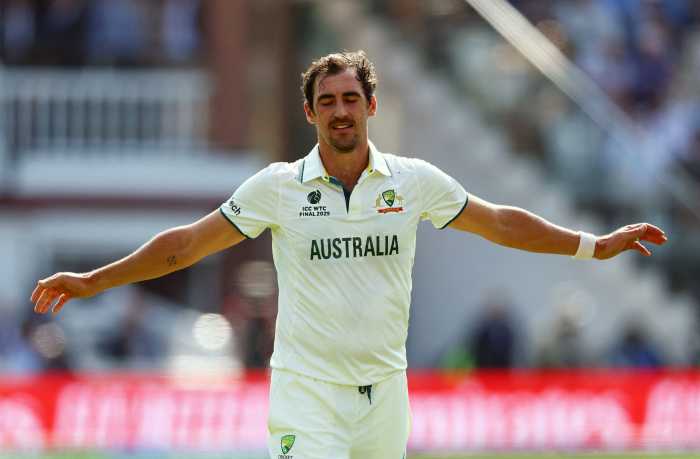Leonardo DiCaprio plays the enigmatic Howard Hughes in Scorsese’s ‘Aviator’
Here’s a real conundrum—why would Martin Scorsese spend millions of Miramax dollars on scrupulous ‘40s Hollywood research and production for “The Aviator,” his biopic of Howard Hughes, and then cast some blandly handsome, soap opera-looking guy as Spencer Tracy, whom many considered the most distinctive film actor of his generation?
And never mind that Scorsese has Katharine Hepburn (Cate Blanchett), as Tracy’s great inamorata, wearing slinky Jean Harlow gowns and partying at the Coconut Grove—in short, doing what that publicity-shunning, super-private actress never did in real life.
Blanchett, expert actress that she is, gives a witty impersonation, although her broad Aussie beak is a far, flat cry from Hepburn’s actual one, once described in song by Cole Porter as “the perfect nose.” Blanchett figures prominently in the early movie-making period of Hughes’ life, which is, admittedly, by far the most diverting section of this overlong film. Their titanic affair is scripted by John Logan as a facile, none-too-inspired screwball comedy, which, for all its behind-boudoir-doors efforts, doesn’t begin to capture the real fun and romance suggested by a series of ardent, witty, disguised-identity telegrams they sent one another during Hughes’ record-breaking 1938 round-the-world flight, on display at Hepburn’s recent estate auction at Sotheby’s.
It’s a sad fact that, these days, Scorsese doesn’t seem to be able to make anything less than an epic, which would be all right if the content of his films merited their length and, too often, overt violence. Despite Scorsese’s deep knowledge of and love for film, it’s fairly obvious that his last really entertaining one was “Goodfellas,” 15 years ago.
Apart from perhaps the most harrowing airplane crash in film history, much of “The Aviator” is a big wide yawn. There are endless scenes of Hughes conferring with engineers over how to build the perfect plane and later, protracted courtroom sequences in which, under investigation for corruption, he tries to wrest commercial control of the airways from Pan Am’s then-monopoly. And, once Hepburn leaves him, the Hollywood-based scenes become trite and dull with interchangeable actresses playing his replacement lovers, Faith Domergue (Kelli Garner) and Ava Gardner (Kate Beckinsale, way out of her chirpy element as the most beautiful, sensual woman to ever walk the screen.
Portrayals of movie stars are always a dicey onscreen proposition. Those great luminaries are such indelible icons in our general consciousness and Scorsese, apart from the triumphant casting of Blanchett, descends into shoddy TV Movie of the Week trumpery—anyone remember Lynda Carter as Rita Hayworth? A too-angular and knowing Gwen Stefani muddles our memory of the cherubically innocent wild child, Jean Harlow (star of Hughes’ totemic “Hell’s Angels”), while the now ubiquitous Jude Law is an epicene Errol Flynn.
The film’s major asset is Leonardo DiCaprio, who in every sense, leaps from boy to man, to become Hughes, a natural star, from enthusiastically callow youth to paranoid middle age. In his fedora, with a toothbrush moustache on his baby face, DiCaprio is a dead ringer for the familiar photographs of this manic millionaire. His best moment comes early on, when he breathtakingly seduces a nightclub waitress with a radiant intensity that easily convinces you of Hughes’ reputation, moolah aside, as one of Hollywood’s greatest cocksmen, who had every goddess in town, from Billie Dove and Bette Davis to Ginger Rogers and Lana Turner.
Hughes’ famous mania for cleanliness and phobia with germs, in DiCaprio’s over-washed hands, becomes something real and pitiable. In fact, Scorsese’s basic explanation of Hughes’ character occurs in his opening scene of the naked boy, Howard, being scrubbed down during a Texas cholera plague by a scarily domineering mother. Hughes was also partially deaf, something largely treated as an easy joke here. The scenes of Hughes going crazy are the weakest of Logan’s vast sketch of a script, and there’s not much that DiCaprio can do with them, besides manically repeat certain phrases over and over. Any kind of psychological depth completely eludes the filmmakers, and a prolonged sequence of paranoid isolation, with Hughes, naked, crazed and unkempt in his ravaged mansion, is disastrously attempted.
Surely, Scorsese might have come up with something more innovatively cinematic to suggest the undoing of this man’s mind besides a long tracking shot of endless bottles filled with urine.
This nearly three-hour film ends during the late ‘40s on an unfinished, definitely unsatisfying note. It’s unfortunate that you will likely stagger out, your eyelids heavy and your benumbed brain still full of many unanswered questions about the man.



































